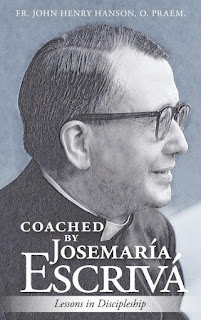Coached by Josemaría Escrivá:
Lessons in Discipleship
Father John Henry Hanson, O. Praem.
ISBN 9781594175084
eISBN 9781594175091
When I read the first book in this series, Coached By Joan of Arc by Alexandre Havard, I was unaware it was the beginning of a series. Both are excellent reads. This one makes several references to the one on Joan and what Havard did in that work. I have been aware of Father John Henry Hanson but had not read any of his other works prior to reading this volume. A couple have jumped way up in my ‘to be read’ pile after reading this one.
The description of this book states:
“Born at the turn of the 20th Century, Josemaría Escrivá spent his life as malleable clay in the Potter's hands. He took on a very visible leadership role as a priest and founder of Opus Dei, with a substantial collection of writings and recorded talks "revealing the personality, tone of voice, mannerisms, and spirit of the man."
In this book, Fr. John Henry Hanson explores this role of leader and coach that our saint lived while on earth and continues to live today.
Never one to mince words or refrain from action, Josemaría coaches us in work and rest, in times of struggle and ease, through confusion and certainty. Josemaría is for all of us – men and women of today, living and working in the midst of the world. He is for us all a coach, a father, and an excellent teacher of the elevated, virtuous, and courageous life.”
The chapters in the volume are:
Introduction: Speaking Confidentially
One: Is It All about Work?
Two: What Work Is All About
Three: Rest, Recreation, & Renewal: Luxury or Duty?
Four: Not for Your Coffee Mug: The Unquotable St. Josemaría
Five: Clay Made Divine: Material for Sanctity
Six: Strong Language: The Tough Talk We Need
Seven: Even Stronger Language: The Encouragement We Need
Eight: Struggle & Perseverance
Nine: “What Are You Waiting For?”
I highlighted numerous passages while reading this book, some of them are:
"I have noticed at times how an athlete’s eyes light up at the sight of the obstacles he has to overcome. What a victory there is in store! See how he conquers the difficulties! God Our Lord looks at us that way. He loves our struggle: we will win through always, because he will never deny us his all-powerful grace. Thus, it doesn’t matter if we have to fight, because he does not abandon us.—St. Josemaría Escrivá, Friends of God, no. 182"
"The main point, however, is not what the world makes of her, but what God made of her. Saints, empowered by God’s grace, can do just about anything—indeed, “all things in him,” as St. Paul attests (Phil 4: 13)."
"Those who have faith marvel at St. Joan of Arc, but we don’t write her off as an historical fluke—as though she just happened to be in the right place at the right time, and impersonal forces randomly converged to make her mission possible. Her story has God’s fingerprints all over it."
"With St. Josemaría Escrivá (1902–1975), no such imaginary monologues or pep talks need be dreamt up. He has left us with not only a substantial collection of written works, but also numerous hours of video footage. Many of his talks and dialogues in Opus Dei get-togethers (convened in small groups or among hundreds, sometimes thousands) are recorded for us, revealing the personality, tone of voice, mannerisms, and spirit of the man who founded The Work of God."
"Why this is important to mention in a book like this is that he already considered his relationship to his spiritual children to be both fatherly and directive—qualities of a good coach."
"From all the personal advice St. Josemaría addresses to his readers in books such as The Way, Furrow, and The Forge, this book will attempt to distill and reflect on certain of the saint’s counsels aimed at disciples and discipleship. In his writings and talks, he addresses leaders, souls of prayer, parents, students, many different types of people, and many aspects of Christian life. Our focus here is to glean lessons in discipleship from one who considered himself just that, a disciple, before anything else he later became."
"David’s defeat of Goliath is not the classic exception to the rule; it’s not the story of a kid who got lucky, but of one who faced his adversary with the Lord’s wisdom and strength, and God’s weakness is more powerful than human strength. David was outmatched only in build and fierceness, but not in courage and skill, nor especially in faith."
"It means spending time doing nothing else than being with God—keeping feet and hands still and, what is perhaps more difficult, keeping mind and heart at rest."
"This calls for an essentially contemplative vision of life, “in the middle of the street,” as St Josemaría often repeated. Just as the people of Jesus’ time had to look beyond (not disregard) his human appearance in order to see God, so must we arrive at a clarity that leads us to the treasure buried in an otherwise nondescript field. The sameness that characterizes most of our relationships and activities is the unspectacular setting in which God chooses to reveal himself."
"If you cite those instances when St. Josemaría praises “work without rest,” 17 let’s be clear that he does not mean “never rest,” but that when we work, we should be tireless in our efforts. In other words, to do everything with its proper intensity. It is the same in physical training or working out: you push through your reps, you sprint with all your might, because if you rest while doing either, you never make progress. It’s only after you’ve spent your energy that rest is in order."
"Tension inevitably strains both mind and body as one concentrates on the details of work, striving to do a good job. But releasing that tension is indispensable. People who never give themselves this permission do eventually break. And sometimes this brings discredit upon themselves and the work they’ve been busy about."
"But on a deeper level, we need to seek renewal in God. We have dwelt on this point already, but perhaps as a practical application we need to schedule days or hours of prayer, of retreat. An annual retreat, a monthly evening of recollection, a daily holy hour before the Blessed Sacrament—taken together, these renew the soul of the apostle. When we go to the source of life, we are rejuvenated, made youthful again in spirit."
"The answer is prayerful reflection and honest examination of oneself. Why did I fail? Is there something about a success that might be harmful? Sometimes, even at the cost of some attainment, the Lord lets our efforts fail because our success would be our downfall."
"We begin the life of discipleship poor, and our goal is to remain poor, even to grow in poverty. With eyes taken off of self, with no pretensions to excellence, with a simple joy that God notices me at all and delights to use me in some small corner of his kingdom . . . yes, I will be a garbage can in the Lord’s kingdom any day. Put me on some street in his city, preferably a backstreet, and I will serve there, awaiting his cleansing and beautifying of my very ordinary self."
"His love makes us who we truly are, who we are meant to be. If we see ourselves as basically fine and complete without God, we leave very little room for growth. Actually, we see a complete distortion: we are not even close to our true selves, our best selves, until we first completely humble ourselves before the Lord. Only those prostrate on the earth can be lifted up, only they can be exalted, only the least and last can be first."
"A lesson all of us need to take to heart: the deeper we are in self-knowledge, the deeper our compassion runs for the miseries of others."
"Sometimes the kind and gentle approach just won’t do. To get someone’s attention and to show them the seriousness of the situation, the verbal equivalent of smelling salts is sometimes in order."
"In addition to knowing that your coach or teacher loves you and wills your betterment, you must also know something crucial about yourself: You can do better. You are called to great holiness. Your vocation is to eternal glory. You are called to a place where only the “spotless” may enter (Rv 14: 5), hence the need to get serious about purifying self of dead weight, dross, and disorder."
"Our field of battle is also the job site where the spiritual edifice grows, and we are constantly waging war within against our tendencies to self-assertion, complacency, and egotism. The fight can potentially discourage, especially when we give ground here or there."
"Hence the impatience of our coach that we get going on this. These are not small matters we may take or leave. This is the Christian life fully lived. Life not fully lived is partially dead or dying. Can we settle for that? Doesn’t God deserve better from us? Isn’t the world in desperate need of the Gospel? If we are the salt of the earth and light of the world, we cannot at the same time rot and darken our areas of influence by refusing to exert a Christian influence."
I hope those quotes give you a feel for this volume. It is an excellent read. The material is clearly presented. It is easily accessible and could be used by a high school student up to a retiree. The writing is crisp and clean. When I started reading this, I planned on a chapter a day, but could just not put it down. As soon as I finished, I put it back on my ‘to be read pile’ to reread it again this time maybe I can stick to a chapter a day.
This is an excellent volume that I can easily recommend. And I look forward to seeing what the next in the series will be.
Note: This book is part of a series of reviews: 2024 Catholic Reading Plan!
Books in the Scepter Coached by Series:
Coached by Josemaría Escrivá - Henry Hanson, O. Praem.
Coached By Joan of Arc - Alexandre Havard
…
Books by Fr. John Henry Hanson:
Scatter My Darkness
Praying from the Depths of the Psalms
Home Again
…
Books by St. Josemaria Escriva:
Christ Is Passing By
Conversations with Saint Josemaria
The Forge
Friends of God
Furrow
Holy Rosary
In Love with the Church
The Way
The Way of the Cross
The Way of the Cross - Booklet Illustrated Michael O'Brien
Christ Is Passing By
Conversations with Saint Josemaria
The Forge
Friends of God
Furrow
Holy Rosary
In Love with the Church
The Way
The Way of the Cross
The Way of the Cross - Booklet Illustrated Michael O'Brien
The Way, Furrow, Forge (3 in 1 Edition)
...
Books about St. Josemaria Escriva:
A Man Who Knew How to Forgive: Lessons from the Life of St. Josemaria Escriva - Francesc Faus
Praying 15 Days with St. Josemaria Escriva - Guillaume Derville
Volumes in the St Josemaria Escriva's Collected Letters:
Letters 1: Singuli dies, 24 March 1930
Letters 2: Videns eos, 24 March 1931
The Burgos Letters (1938-1939): Three Circular Letters
Letters: Letter 3: Res omnes, 9 January 1932
Letter 4: Vos autem, 16 July 1933 : Letter 4: Vos autem, 16 July 1933
Letter 5: Euntes ergo, 2 October 1939
Letter 6: Sincerus est, 11 March 1940
Letter 7: Quem per annos, 24 October 1942
Letter 8: Legitima hominum, 31 May 1943
…
Other Posts:
...






















